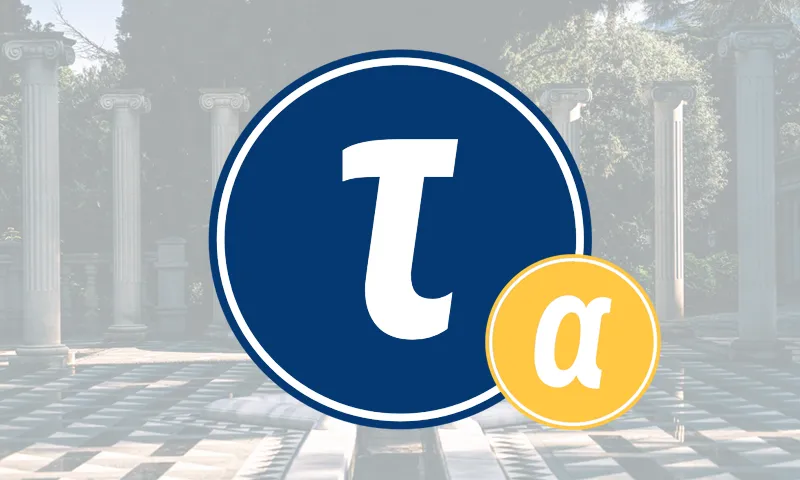
In anticipation of Tau's demo some time around the end of this year, I'd attempt to publish a series of articles leading up to its release and beyond on Steem (Update @ 2019: it has been delayed as development is taking much longer than expected). If you would like to get to know what some of us think is going to be one of the greatest inventions of all time, I'd recommend you to check out https://tau.net/. It seems like a foundation that we've missed out on building together since the birth of the Internet.
A close resemblance of this project is the Semantic Web, although some of us would place Tau as being far more ambitious in scope, oddly in a way that is likely more feasible with its ingenious use of a logic blockchain to power a decentralized social choice platform. I think it's impressive how singular the concept actually is, despite the unavoidable lengthy explanations that come paired with the many first-time features that Tau will provide.
Without further ado, let's explore this world-changing technology that is currently baking in the oven.
What is Tau?

Let's begin by first checking out the opening of the website at https://tau.net/:-
Tau is a decentralized blockchain network intended to solve the bottlenecks inherent in large scale human communication and accelerate productivity in human collaboration using logic based Artificial Intelligence.
Sounds fairly straight-forward at first glance, and to me, it really stands out in the cryptosphere. We now have millions and billions of people using the Internet everyday, yet we still do not have any effective means of discussing and collaborating without being all over the place. Sure, we may have been pouring a lot of our time and effort into various platforms trying to connect with others, but have things been really any different compared to a time before the Internet?
The speed of information propagation has increased by orders of magnitude, and we can reach anyone on the planet now, but it's still really up to us to be present and be able to process information in our heads before turning them into relevant knowledge for our networks.
Expanding our social bandwidth.

Turns out, we have been experiencing a lot of trouble coming to terms with the chatter of billions of people in cyberspace. The bottlenecks inherent in our human bandwidth remain to be unsolved even with near-instantaneous communications. From governments to corporations and blockchain communities, we are all still facing the age-old problem of being unable to scale governance beyond the size of a classroom. It's just difficult to get our points across to many different people, let alone making sense of complex long-term discussions and making network-wide decisions collaboratively.
The introduction to The New Tau written by Ohad Asor explains our situation quite accurately:-
Some of the main problems with collaborative decision making have to do with scales and limits that affect flow and processing of information. Those limits are so believed to be inherent in reality such that they're mostly not considered to possibly be overcomed. For example, we naturally consider the case in which everyone has a right to vote, but what about the case in which everyone has an equal right to propose what to vote over?
In small groups and everyday life we usually don't vote but express our opinions, sometimes discuss them, and the agreement or disagreement or opinions map arises from the situation. But on large communities, like a country, we can only think of everyone having a right to vote to some limited number of proposals. We reach those few proposals using hierarchical (rather decentralized) processes, in the good case, in which everyone has some right to propose but the opinions flow through certain pipes and reach the voting stage almost empty from the vast information gathered in the process. Yet, we don't even dare to imagine an equal right to propose just like an equal right to vote, for everyone, in a way that can actually work. Indeed how can that work, how can a voter go over equally-weighted one million proposals every day?
All known methods of discussions so far suffer from very poor scaling. Twice more participants is rarely twice the information gain, and when the group is too big (even few dozens), twice more participants may even reduce the overall gain into half and below, not just to not improve it times two.
It turns out that under certain assumptions we can reach truly efficiently scaling discussions and information flow, where 10,000 people are actually 100 times more effective than 100 people, in terms of collaborative decision making and collaborative theory formation. But for this we'll need the aid of machines, and we'll also need to help them to help us.
So how is Tau actually going to solve our communications bottleneck? It will be through a highly bespoke and non-trivial implementation of a logic-based Artificial Intelligence (AI). It's worth noting that AI in this case is more of a buzzword for marketing-speak, and it is actually not of the same variety as the commercial implementations of deep machine-learning.
The distinction that must be made is that Tau is not the kind of AI that attempts to guess what the world is around them, including that of our opinions and the things we say or do. Instead, we must make the step towards communicating through Tau and what we choose to communicate will be as definite as computer programs. It can be thought of as a persistent logic companion that helps us improve the scale our reasoning, logic, and bandwidth.
We can take the time to share what we want to share on the Tau network and most of the logic-based connections and operations will happen in the background over time, even when we're not paying attention in-person. Again, the use of the word AI is a misnomer here because it usually paints the picture of AI agents attempting to mimic human autonomy. That's not what Tau is about. In this case, thinking about Tau as just a logic machine should provide better clarity on what it actually is.
The power of logic.

To expand, here's the second paragraph found in the opening of the website that explains Tau's paradigm in logic-based communications, https://tau.net/:-
Currently, large scale discussions and collaborative efforts carried out directly between people are highly inefficient. To address this problem, we developed a paradigm which we call Human-Machine-Human communication: the core principle is that the users can not only interact with each other but also make their statements clear to their Tau client. Our paradigm enables Tau to deduce areas of consensus among its users in real time, allowing the network to boost communication by acting as an intermediary between humans. It does so by collecting the opinions and preferences its users wish to share and logically constructing opinions into a semantic knowledge base.
Indeed, Tau will offer a semantic social choice platform where we can discuss and store knowledge in a logical universe that helps us organize information, thereby empowering us in highly relevant ways. If you're worried about privacy, know that Tau is first-and-foremost designed as a local client with local processing and storage. The platform itself will be deployed as a decentralized peer-to-peer network, a place where we can connect and share our knowledge-base with anyone we desire.
The only price to pay in all of these is that we must speak in Tau-comprehensible languages, which can always be added and modified over time. A sophisticated language that can be defined over Tau may closely resemble natural languages, but it is really best to expect Tau as a machine-comprehensible language that only speaks in logic. Fortunately, logical formalism is something that we can easily deal with.
So it will be up to us to communicate with our local Tau client in a way that it'll understand our worldviews. When the machine understands what we share completely in some logical, mathematically-verifiable sense, it can then connect our dots with the rest of the Tau network, effectively boosting communications beyond the limits of human bandwidth, effectively scaling our points of discussion, consensus, and collaboration up to an infinite number of participants.
Code and consciousness.

Finally, we look at the last paragraph of Tau's introduction at https://tau.net/:-
Able to deduce consensus and understand discussions, Tau can automatically generate and execute code on consensus basis, through a process known as code synthesis. This will greatly accelerate knowledge production and expedite most large scale collaborative efforts we can imagine in today's world.
Since Tau is a logic blockchain that powers a semantic social choice platform, we can leverage it to have both small and large-scale discussions about program specifications, detect points of consensus, and even generate software in the process. Being able to go from discussions to the realization of decentralized applications would mean inclusive code development for the masses. It's also a unique addition to decentralization that no other blockchain projects have even thought about.
Now that we may have come to a better understanding of Tau's emphasis on the use of logic in every part of its being, let's revisit the process description found in The New Tau to get closer to knowing what it really is about:-
We are interested in a process in which a small or very large group of people repeatedly reach and follow agreements. We refer to such processes as Social Choice. We identify five aspects arising from them, language, knowledge, discussion, collaboration, and choice about choice. We propose a social choice mechanism by a careful consideration of these aspects.
We describe a decentralized computer network, Tau Chain, and as such, which social decisions may it support? The most that computers can do is to run programs. Over Tau Chain we can gather knowledge and agree or disagree over it, and we can also actually do something and perform actions as arises from the discussion over the platform. Those actions, are nothing but computer programs. And the most important program on our scope is the platform itself.
The main choices collaboratively be made over the system, are about the system itself. Tau, is a discussion about Tau. Or in a little more elaborate yet succinct definition:
Consider a process, denoted by X, of people, forming and following another process denoted by Y. Tau is the case where X=Y. That's the Tau. What the Tau is doesn't matter, what matters is that it can change into anything we want it to be. Further, Tau is a computer program, so we refer to a program that changes itself up to the collaborative opinions and decisions of its users.
It should be remarked that we do not let Tau guess the people's opinion, or even perform well-educated guesses as in machine learning, and that's maybe the main reason we use logic. Things said over the platform are as formal and definite as computer programs, they just deal with generic knowledge rather machine instructions.
Having that, a collaboratively self-amending program, it can transform into virtually any program we'd like it to be, or many programs at once. Indeed Tau does not speak only about itself but open for creation of any other individual or collaborative activities, such that we make it possible for small and very large groups to discuss, share and organize knowledge, detect consensus and disagreements, and coordinate actions in forms of programs.
In short, Tau is a decentralized peer-to-peer network that takes the shape of a social choice platform, and it can become anything that we want it to be, for as long as it's expressible within the self-defining and decidable logics of FO[PFP] with PSPACE-complexity. This precise specification is required to satisfy the very definition of Tau as seen in the excerpt above. Tau is also intended to be a compiler-compiler.
This is taking application-generality into a completely different direction compared to blockchains that are built specifically with turing-completeness in mind, like Ethereum. Relevant literature to check out: Finite Model Theory.
Understanding each other.

While it's all highly technical and difficult to grasp in one seating, perhaps a better way to truly begin to understand Tau is to spend some time studying its main features. Or just wait for the product release. In any case, I will try to explore these topics in the future if my brain can still handle it:-
- The Internet of Languages.
- Scaling Discussions.
- Global Knowledgebase.
- Accelerating and Automating Collaboration.
- Real Time Social Choice.
- Agoras Smart Knowledge Economy.
The more I think about Tau, the more I think that it is (poetically) a logical conclusion to the way the Internet works as a protocol. It even lives and breaths logic. Not just any kind of logic, but specifically, logics that can define their own semantics and is decidable. Tau is intelligently designed to be a truly dynamic and ever-evolving blockchain.
When the Tau community intends to make changes to the network code, rules or protocols, they will simply need to express these opinions and perspectives in a compatible language over the network. The self defining logic of the Tau blockchain network will enable it to detect the consensus among these opinions and automatically amend its own code to reflect this consensus from block to block. Unlike the common method of voting, Tau’s approach will take into account the perspectives of the entire community, where people will be free to vote and propose what to vote for in real time. This unique ability of Tau is the only decentralized solution to create a truly dynamic protocol.
An excerpt from https://tau.net/
Now you might think: Tau seems like a powerful tool but will it be too difficult to use for most people? There might be some learning curve involved for sure, and it'd be similar to learning a new language in the beginning. Those of us who learn to use it well enough to scale our discussions and collaborative works will likely gain a significant edge over those who are not using the platform. I'd imagine plenty of projects and communities around the world being able to overcome some of their obstacles in development through Tau. Hence, it may be fair to expect that market forces will gravitate towards the platform just like how we're all using the Internet these days.
Until the next post.
I've been thinking about Tau almost everyday for the past many months now, and I will admit that its deeper technicalities are still way out of my league, although I've made sure to word them broadly out the best I can. If you like what I do, please consider sharing this post and voting on my witness account on Steem. For more info, check out my recent witness announcement post.
As always, thanks for reading!
ありがとうございました
Images from Pexels
Music tracklist by Magical Mystery Mix
Follow me @kevinwong / @etherpunk
Always do your own research.
